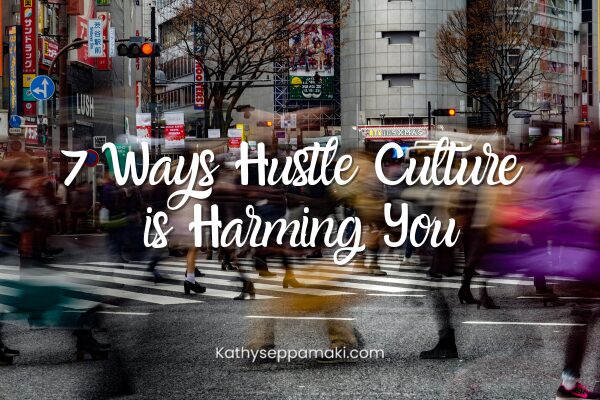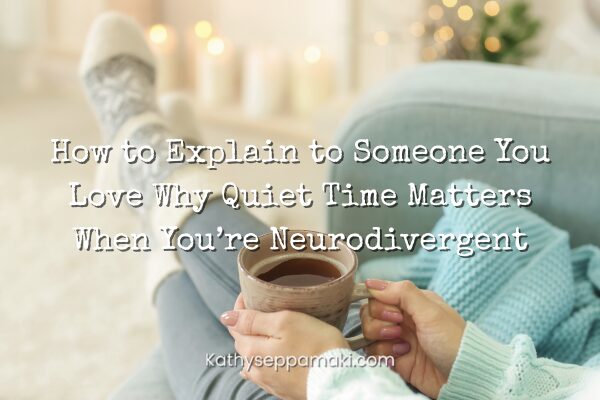Here in the United States, there is an idea about work that has been promoted to workers that has become the norm. And yet, when you’re neurodivergent, this idea may not only compromise your well-being but may also set you up for illness. Hustle culture is the idea that one should work hard all the time, sacrificing personal time and well-being for the sake of professional success. It’s the glorification of constant productivity, long hours, and grinding at all costs. While it may seem like a noble and effective way to achieve one’s goals, it can be quite harmful to your mental and physical health. Despite that, I continue to see hustle culture being pushed to the masses. But there are a few problems that come with making hustle culture the norm.
Hustle culture promotes the idea that your worth is tied to your productivity and success. This can lead to feelings of inadequacy and burnout because you are unable to meet these high standards. It can be further complicated when life circumstances make it difficult to work as hard as you would like. And life should never be only about working to make money. Having a healthy work/life balance is an important part of living a satisfying and healthy life. Having to hustle all the time can negatively impact overall well-being.
Let’s look at how hustle culture may impact you when you’re neurodivergent!
1. Chronic stress and burnout happen faster!
With the hustle comes a lot of overworking! However, constantly pushing yourself to work long hours without adequate rest can lead to chronic stress. This persistent stress response can result in physical and mental exhaustion, commonly known as burnout. This constant, fast pace may also directly impact your mental health. The pressure to always be productive can contribute to anxiety, depression, and feelings of inadequacy, especially when you are unable to meet the high expectations set by hustle culture.
Many neurodivergent people already expend extra energy masking or managing sensory sensitivities, executive dysfunction, and overstimulation. Add hustle culture’s pressure to constantly perform, and burnout becomes not just likely — it becomes chronic and debilitating.
2. It ignores a brain that’s wired differently
Neurodivergent people (those with ADHD, autism, dyslexia, etc.) often have brains that operate outside of the typical “9-to-5 grind” structure. Hustle culture demands conformity to rigid schedules, fast output, and multitasking, which can directly conflict with how a neurodivergent brain functions best.
3. Productivity is tied to self-worth
Hustle culture often links value to output: “You are what you produce.” For neurodivergent people, whose productivity might fluctuate due to mental health, sensory overload, or focus challenges, this messaging can fuel shame, imposter syndrome, and internalized ableism.
4. Resting is seen as laziness
Rest is essential for neurodivergent nervous systems, but hustle culture equates rest with weakness. This pressure can make neurodivergent folks feel guilty for needing breaks or not keeping up, even when those breaks are vital for functioning.
5. Non-linear thinking is penalized
Neurodivergent people often bring creativity, deep focus, or unconventional problem-solving to the table. Hustle culture, however, tends to reward speed and standardization, not deep thinking or innovation that takes time and mental space.
6. Reinforces ableist systems
Hustle culture is rooted in ableist systems that prize neurotypical productivity patterns and penalize divergence. It pushes the idea that only one way of working (fast, constant, outwardly productive) is valid, leaving neurodivergent folks feeling excluded, broken, or unworthy.
7. Normalization of overwork
Overworking regularly is NOT okay. And it should never become the norm, particularly if you are neurodivergent. Hustle culture can normalize overwork, leading to toxic work environments where employees feel pressured to work beyond their limits, often without adequate compensation or recognition. In hustle culture, rest and leisure are often stigmatized as laziness, discouraging people from taking necessary breaks or vacations, further contributing to burnout.
This is something I faced for years. Like many neurodivergent people, I am a people pleaser. And my people pleasing caused me to push myself far past my limits for a long time. For me, this came at a cost…an increase in health issues, and far more time spent in burnout. It took decades to realize that I cannot push myself the way I had been. I am now working in a way that works better for me!
But rest is an important part of helping to keep you healthy… physically, mentally, and emotionally!
What works better for neurodivergent people:
-
Flexibility in work hours and environments
-
Permission to rest without guilt
-
Validation of non-traditional productivity
-
Emphasis on sustainability over speed
-
Support for pacing, hyperfocus cycles, and energy management
Hustle culture may promise you success and achievement. Additionally, it often comes at the cost of your health and well-being. It’s important to recognize the importance of balance, self-care, and rest to help you live your best life.




